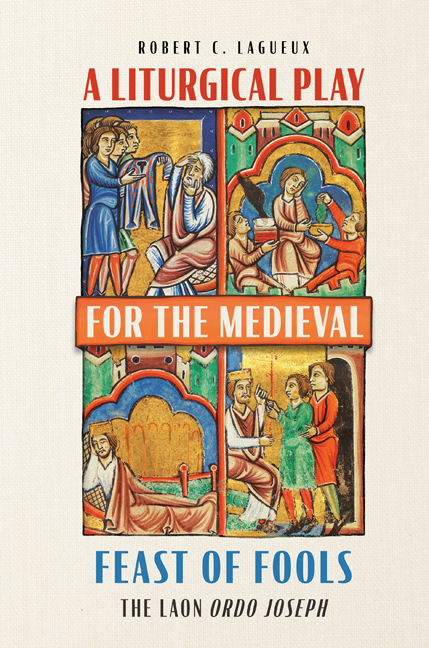Introduction: A New Play for the Feast of Fools
Published online by Cambridge University Press: 17 December 2023
Summary
Since its revival and staging by Noah Greenberg and New York Pro Musica in 1958, the Beauvais Danielis ludus (the Play of Daniel) has remained the most famous piece of medieval liturgical theater, known not only to scholars but also to non-specialists through the many recordings and stagings the play has seen in the last fifty years. That successful produc¬tion is responsible for the play's enduring popularity, of course – one cannot mention the Daniel play without also mentioning it. Greenberg was the impetus behind the project, but he also served as a kind of co-author of the work, inserting several additions to the transcription of the play made by musicologist Rembert Weakland. Greenberg included extensive narrative verse passages composed by W. H. Auden, instrumental items not present in the medieval source, and a newly invented character, Balthasar's Prince, which was “created so that responsorial singing could be used in some of the processions.” He justified this supplemental material by noting that “this was the first public performance since medieval times, and those of us involved in the preparation felt we had the responsibility to present both an historically ‘accurate’ version as well as living performances that would do justice to this truly remarkable piece.” One could argue that these additions were editorial overreach, erring more on the side of what Greenberg euphe¬mistically referred to as “living performances” rather than “historically ‘accurate’ “ ones, but the production was reviewed favorably by critics, its “explosive energy” establishing it as “the bellwether of the medieval music-drama revival.” Since then, the Play of Daniel has been recorded or staged by at least a dozen other ensembles.
Yet the Beauvais Danielis ludus is a masterpiece even without these addi¬tions. It is a rich text that captures the imagination, even when simply read to oneself. The amount of musical material alone is impressive. Scholars such as C. Clifford Flanagan have remarked on the Daniel play's “great literary and musical ingenuity”; Susan Rankin notes its considerable “melodic invention, matching each different poetic form (of which there are many) with a new group of melodic ideas”; and William Smoldon characterized the play as “one of the leading treasure-houses of medieval secular music.”
- Type
- Chapter
- Information
- A Liturgical Play for the Medieval Feast of FoolsThe Laon <i> Ordo Joseph</i>, pp. 1 - 16Publisher: Boydell & BrewerPrint publication year: 2023



